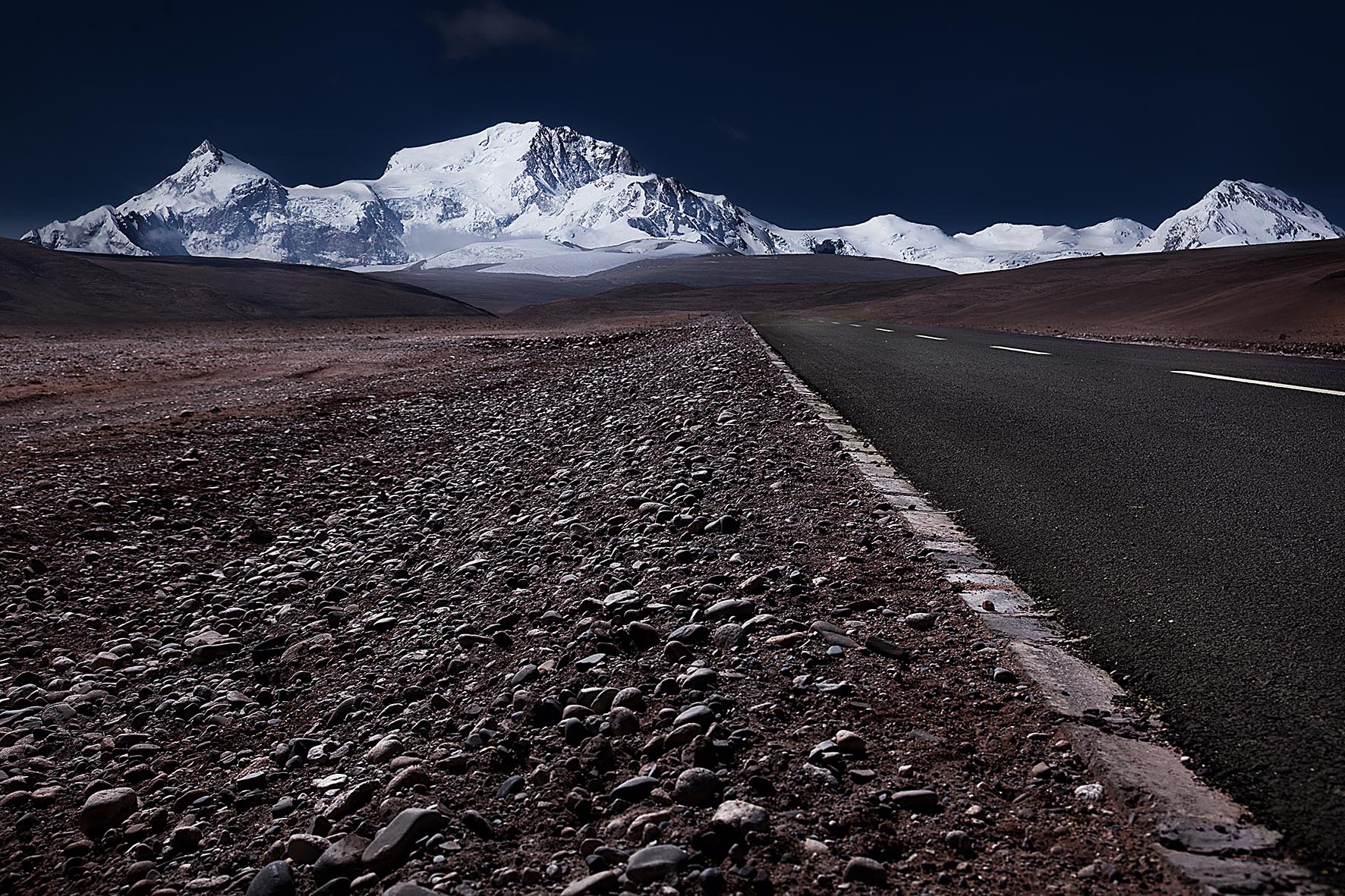
When “The Great Game” (political aspiration to control Central Asia) was being played in Central Asia between political powers of Britain, France and Russia, it was Sir Aurel Stein (1862 – 1943) a Hungarian adventurer, who led an expedition to Taklamakan desert (present day Xinjiang, Uyghur Autonomus Region of China). Prior to this it was believed that entry into Taklamakan was a one way road. Enter at your own risk and don’t expect to return. Rai Bahadur Lal Singh (1860 – 1930), a Sikh cartographer accompanied Aurel Stein as his key confidant in the expedition set out to confirm the theories about rich past of the Silk route (connecting China with Central Asia). Rai Bahadur Lal Singh’s motivation in this expedition was to map the remote Taklamakan territories.
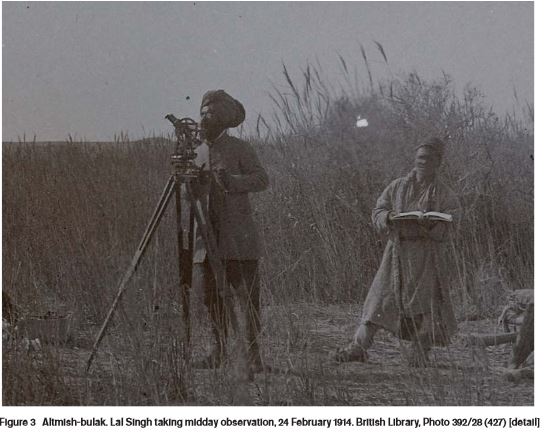
The expedition was successful in discovering many Buddhist paintings and sculptures. Amongst these were the 100 wooden tablets of 105BC, written in ancient Indian script bearing Indian seals. The most noteworthy discovery was “The Caves of Thousand Buddhas at Dunhuamg”. The artifacts were contributed to Britsih Museum and later split across the museums in Britain, India and Hungary.

While the Chinese government views Aurel Stein’s expedition as a loot journey by a foreign devil, robbing the history of Taklamakan region but one may argue that artifacts lying in museums across the world survived destruction at the time of Chinese cultural revolution.
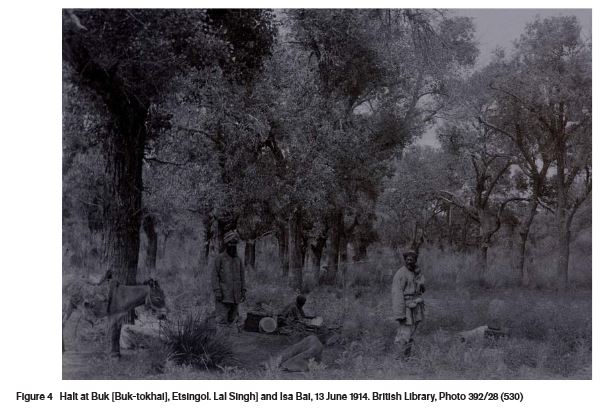
Aurel Stein is recognized in photos clicked during the Taklamakan expedition, always with his dog, named Dash. In his team of explorers one would generally find two turbaned Sikhs. One of them being Rai Bahadur Lal Singh.
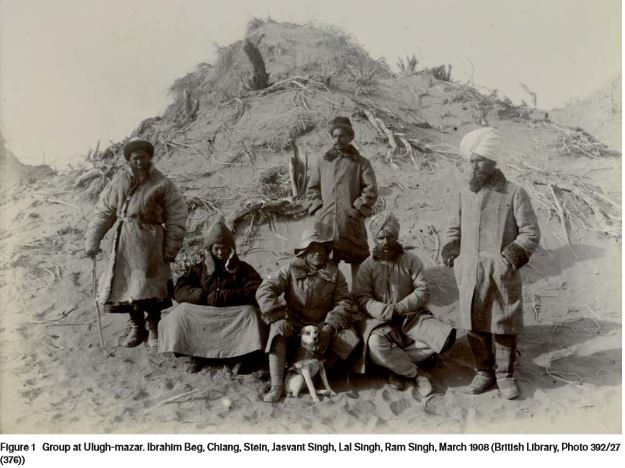
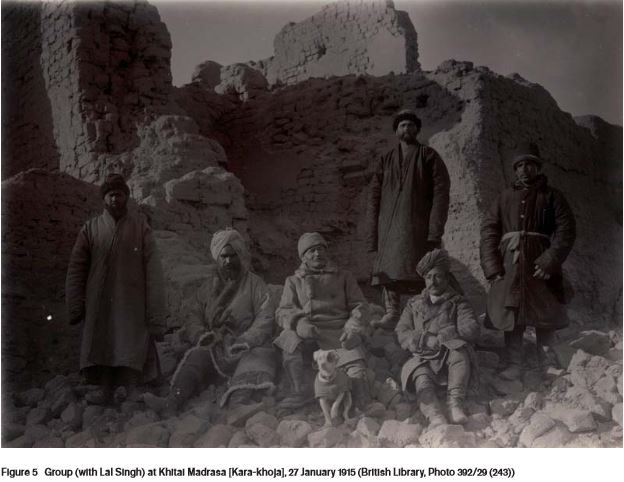
There can be no doubt of Sir Aurel Stein’s high regard for Rai Bahadur Lal Singh. There was clearly an appreciation of his professional and technical capabilities. Stein himself had studied cartography as part of his military training in Budapest, and liked to think in terms of ‘archaeological reconnaissance’. But this was not the only thing they had in common. They were roughly the same age (Lal Singh was born in 1860, Stein in 1862) and they seem to have shared an appreciation of certain human qualities: of independence, self-reliance, resilience and a respect for and understanding of the physical world around them. While it is clear that they enjoyed the company of others (and that others enjoyed their company), they also welcomed a certain amount of solitude away from others. Stein had very fond memories of working with Rai Bahadur Lal Singh, and it would seem that the sentiments were mutual. On 11 August 1930, when Stein set out from Srinagar, he wrote in his notes: “Started from Macphersons at 3 p.m. down Chinar Bagh Canal, after farewell to dear old Lal Singh whose visits had been daily”.
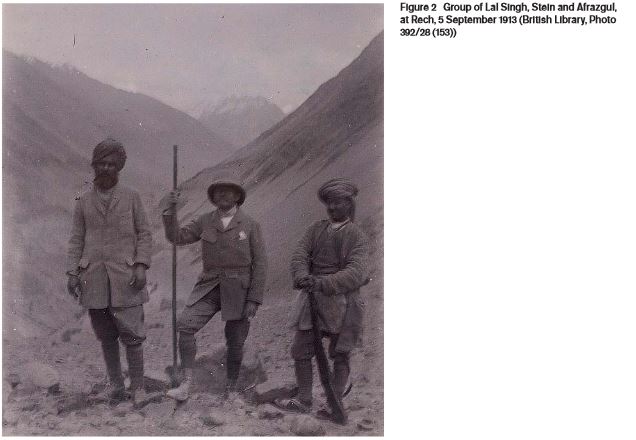
During my extensive travel in Tibet, a drive over two weeks, with my elder daughter (Tarni Kaur) from Lhasa to the remote western region of Indo-Tibet border at Guge Kingdom, many a times we wished we had more time at hand to extend the drive via Kashgar and enter Taklamakan desert, leading to Urumqi. We could not make it to Taklamkan but in photos below is the road we traveled at 15,000 feet, close to Sheeshapangma mountain, that would have led us to Kashgar and Urumqi.
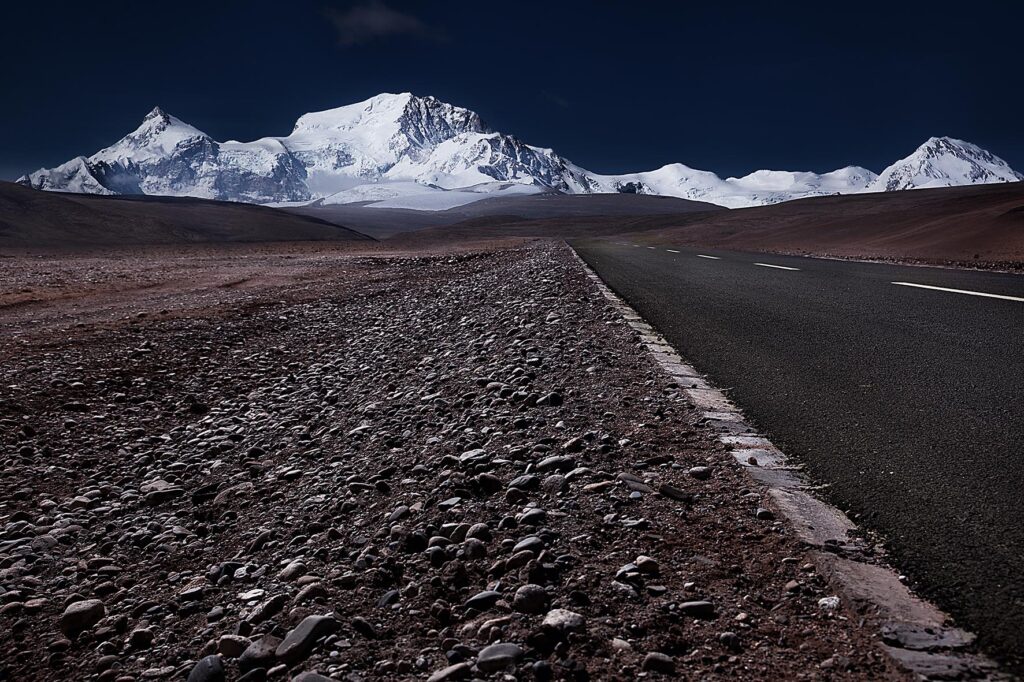
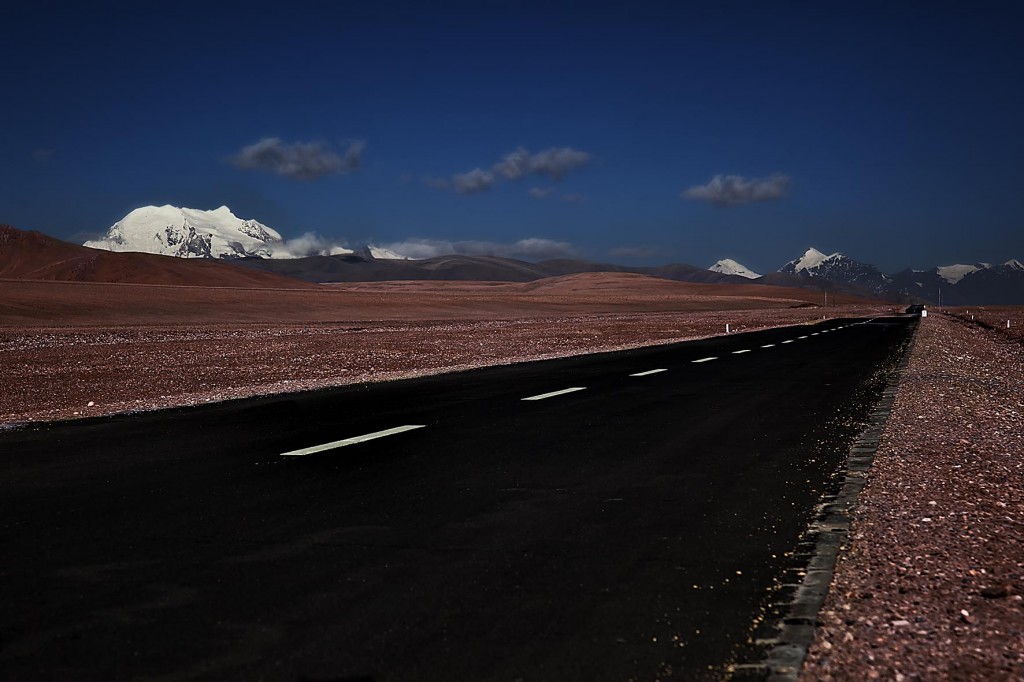
Today, travel to remote areas of Taklamakan is made easy with development of a high altitude road but imagine the time Sir Aurel Stein and Rai Bahadur Lal Singh travelled these areas on foot, accompanied with their Bactrian (double hump back) camels.
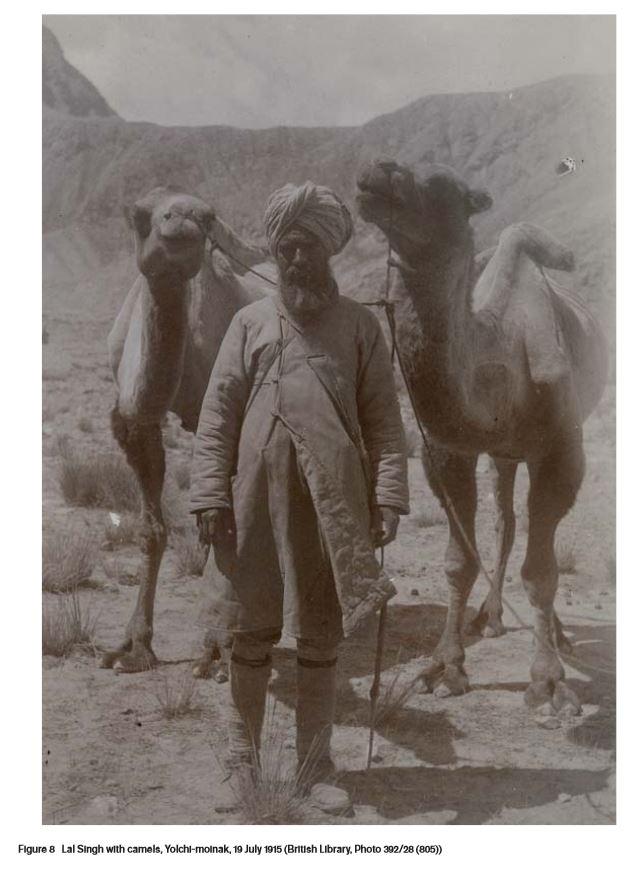
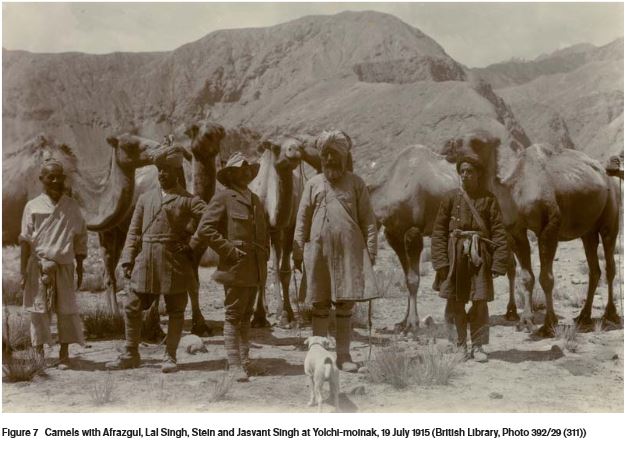
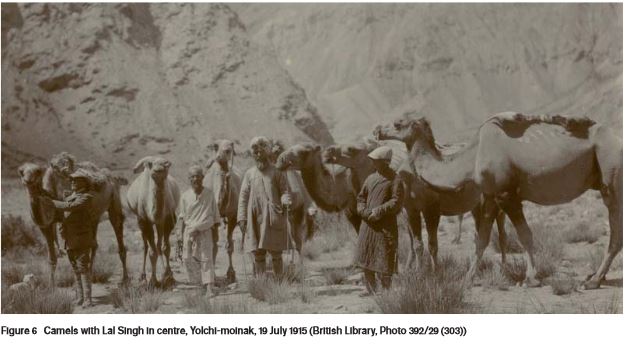
Taklamakan continues to call me and I patiently await the day I will be able to follow the footsteps of Rai Bahadur Lal Singh, reliving the life of this adventurous cartographer.

Comments(28)
Umang says:
January 6, 2014 at 1:40 PMwatching your photography is a treat….and then your indepth knowledge …..simplyu great!
Jatin Walia says:
January 6, 2014 at 4:13 PMAn adventurous past with a interesting connection to a beautiful place.
Not long before you will get to Taklamakan all the Best.
Gurpreet Singh Anand says:
January 6, 2014 at 8:47 PMThis is quite a treat …I always pondered looking at Stein’s picture of accomplices of who are the sikhs in the expedition..now the riddle , thanks to your blog, is solved .I did enter with my family once and then to go back at our origins at the western beginning of it-The Taklamakan Desert in Turkmenistan also.And then went up from Kashgar on Karakoram highway to last point I was allowed as an Indian to Tashkurgan where Chinese Guards came one by one to have a
look at our passports -they had not seen Indian Passports till then(1906)..what a view and what an engineering marvel of straight highway .
And yes in Turfan in Buddhist caves they , the Chinese ,have dared openly written “Antiquities stolen by Foreigners” words stolen which I kept on asking guides in Egypt , Lebanon ,Turkmenistan and Syria to say but the lure of bakshish seals their mouths .
gurnain singh says:
January 6, 2014 at 9:46 PMit seems the first photo was clicked in kashmir as he is wearing kashmiri phirin..it also looks as if lal bhadur singh ji was from kashmir.
Amardeep Singh says:
January 6, 2014 at 10:12 PMAs you would read in the text accompany this blog post, indeed Aural Stein and Rai Bahadur spent time in Kashmir.
virender mehta says:
January 7, 2014 at 10:04 PMWell done Amardeep. Looks like my great grandfather did well.
Amardeep Singh says:
January 7, 2014 at 10:19 PMIndeed Virender. Your Great Grandfather is an inspiration to all of us. As the Taekwondo teacher at Katong Gurudwara (Singapore), you are doing a great job too.
Kim Sander Wright says:
May 20, 2014 at 12:28 AMI would like to connect with you, Virender, as it seems we are related!
Manjinder Brar says:
June 23, 2020 at 7:54 PMExcellent blog,we await your journey to the Taklamakan area which will give us wonderful photographs .The historical context is well researched .
Amandeep Singh Mehta says:
September 10, 2018 at 2:09 PMContact Me Watspp AmanDeep Singh Mehta +918570918161
Hardev Singh says:
January 8, 2014 at 2:38 AMThanks for bringing to light an amazing piece of history _ with your adventurous spirit and camera lens.
Kim SandeWright says:
May 20, 2014 at 12:26 AMR.B. Lal Singh was my great grandfather also. He was not from Kashmir but from Gudgerenwalla in what is now Pakistan, but was then India. The other Sikh gentleman that appears in the photos was his personal cook! I would love to retrace his footsteps some day and I found this excellent website while researching routes and looking for maps. Thank you.
Indu says:
December 8, 2022 at 11:44 PMHi Kim, could you get in touch with me – goobitum@gmail.com? I am currently researching Aurel Stein and would love to speak to you.
Geetali says:
September 25, 2014 at 9:22 AMAmazing story of an inspiring, intrepid gentleman. I live reading about the characters who lived in the time of the Great Game. Happy to have learned about Sardar Lal Singh ji.
Harpreet says:
September 25, 2014 at 9:30 AMAnother treat, thanks for sharing.
kawal nain singh says:
September 25, 2014 at 10:23 AMExcellent study and hat’s off Rai Bahadur Lal Singh. Want to know more about him
Milton D'Silva says:
September 25, 2014 at 11:29 AMAmazing story of human endeavours and the quest for exploring the unknown. Thanks Amardeep Singh for bringing this feature and commentary to us!
Racchit Thapliyal says:
September 25, 2014 at 11:33 AMLove what you do Amardeep- blending history with a medium you excel in! I am a glutton for history and travel, especially in South/Central Asia, and I’m going to follow your work regularly Just added your blog to my feedly RSS reader!
Surupa Chatterjee says:
September 25, 2014 at 2:07 PMSuper Tale of history, trust, respect,friendship, travel and visuals….Yes you must go back there again and present us with part II….
Raj Mehta says:
September 26, 2014 at 7:16 AMAurel and Lawrence have affected the thinking of millions about Kashmir also…This photo-essay is a quality tribute to one of them and to the intrepid spirit of Lal singh…
bikram says:
September 26, 2014 at 6:27 PMwonderful. time capsule u dont find at regular sites. Looking forword to more such capsules espacially about sikhs of JAmmu And Kashmir.
dipikasen says:
September 26, 2014 at 6:37 PMFeeling so proud of being an Indian who has ancestors like Revered Lal Sing…hats off
kishore kumar biswas says:
October 1, 2014 at 10:52 PMHow amazing is History ! It is the tale of gone days . is it only that ? perhaps not, it is more than that.It brings to us a ” part ” of our existence that is veiled behind our ” past ” . We carry within us the traits of our past , our roots , of which we generally remain unaware , unaware of the fact that our personality composed of our tradition.
Here Amardeep with his usual brilliant pictorial notes takes us to our past ,to the forgotten gone days. Men with extraordinary qualities appeared in front of us. We feel how special they were, Sir Aurel Stein and Raibahadur Lal Singh , they were of indomitable spirit. They traveled through the toughest route just to explore more .They lived life of real hero .
Thanks to Amardeep . He in this feature presented not only a part of history but also the glory of indomitable spirit of human being.
rajdeep singh sabharwal says:
October 8, 2014 at 7:52 PMWe dont have words to describe how good and beautiful this collection is.
LAL SINGH says:
August 2, 2015 at 10:56 AMImmensely absorbing.
Amardeep, you have done a great service to Sikhs by exploring these historical places, about which we could never ever have learnt.
Tibet is always considered out of reach for an Indian, due to control by Chinese.
My only familiarity with Tibet was limited to the book “The Third Eye” by Lobsang Rampa.
Congratulations for the great job done.
Dharini says:
November 17, 2016 at 12:58 PMAs an Avid reader of a history I am always looking forward to you.
Dinshaw B. Avari says:
June 23, 2020 at 6:55 PMAmazing story Amardeep!
Hardev Singh Virk says:
June 24, 2020 at 9:29 AMIt s a Wonderful Story and DISCOVERY of Lal Singh. I was in Hungary 5 times and learnt of a Hungarian who was a Linguist and studied Buddhism before his return to Budapest. Not Sure, it is Aurel stein?